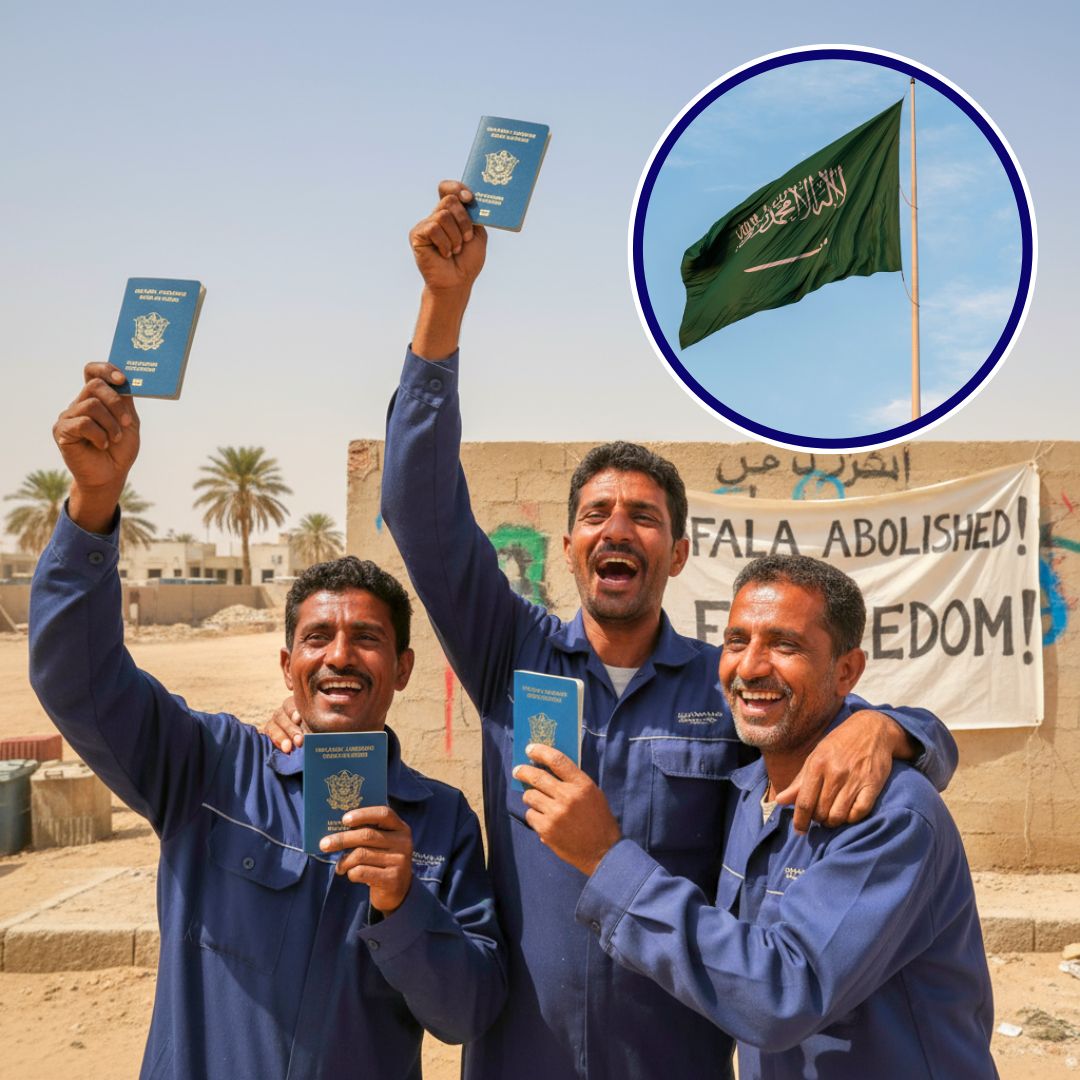Saudi Arabia has officially abolished its 50-year-old Kafala labour sponsorship system, announced as part of Crown Prince Mohammed bin Salman’s Vision 2030 reforms.
The historic move grants approximately 13 million migrant workers, primarily from South and Southeast Asia, greater freedoms such as the ability to change jobs without employer permission and leave the country without an exit visa.
This reform addresses widespread criticism of Kafala as a system enabling exploitation and forced labour, aligning Saudi labour laws more closely with international standards and improving migrant welfare.
What is the Kafala System?
The Kafala system is a sponsorship framework introduced in the 1950s in Gulf countries, including Saudi Arabia, to regulate foreign migrant labour. Under this system, a migrant worker’s legal residency and employment rights were tied entirely to a local sponsor, known as the “kafeel,” usually the employer.
This sponsor controlled whether workers could change jobs, leave the country, or seek legal recourse. Though originally designed to manage cheap labour for developing economies, Kafala evolved into a mechanism that allowed widespread abuses such as passport confiscation, delayed wages, restricted movement, and lack of protection against exploitation. Human rights groups often likened it to modern-day slavery due to these severe power imbalances and mistreatment.
New Labour Protections under Vision 2030
The reforms replace sponsorship with a contract-based employment model, giving workers more autonomy. Migrants may now change jobs without needing approval from their employer, leave Saudi Arabia without an exit visa or sponsor consent, and access strengthened labour courts to report violations.
Officials view these changes as crucial for enhancing workers’ rights, attracting foreign talent, and supporting Saudi Arabia’s economic diversification goals under Vision 2030.
What It Means for South Asian Migrant Workers?
The abolition of the Kafala system in Saudi Arabia brings transformative benefits for about 13 million migrant workers, many from South Asia including India, Bangladesh, Nepal, and the Philippines. These workers, who form a significant part of Saudi Arabia’s labour force in sectors like construction, domestic work, and tourism, now gain greater freedom to change jobs without employer permission and to exit the country without needing an exit visa or sponsor consent.
This helps end longstanding practices such as passport confiscation, wage delays, and restricted movement, effectively alleviating vulnerabilities and exploitation. The reforms also expand access to labour courts, providing safer mechanisms for grievance redress and protection of workers’ rights. By creating a safer, fairer work environment, Saudi Arabia aims to attract more skilled workers and promote equitable labour practices in line with international standards.
The Logical Indian’s Perspective
Saudi Arabia’s abolition of the Kafala system is a vital step towards ensuring dignity, fairness, and human rights in migrant labour worldwide. While legal reforms mark progress, concerted efforts are needed to enforce these protections and change entrenched cultural attitudes. The Logical Indian applauds this development and urges ongoing vigilance and advocacy for global migrant welfare.
News in Q&A
- What is the Kafala system in Saudi Arabia?
The Kafala system, introduced in the 1950s, tied migrant workers’ legal status and job rights to a local sponsor (kafeel). Employers had near-total control, deciding if workers could change jobs, leave the country, or seek legal help. This created power imbalances often leading to passport confiscation, wage denial, and restricted movement. - Why was the Kafala system abolished now?
Mounting international criticism from human rights organisations and labour bodies labelled Kafala as “modern-day slavery.” Saudi Arabia’s Vision 2030 aimed to reform labour laws to modernise society, improve migrant welfare, attract skilled workers, and boost foreign investment, prompting the landmark decision. - Who benefits from the abolition of Kafala, and how?
About 13 million migrant workers in Saudi Arabia, mostly from India, Bangladesh, Nepal, and the Philippines, gain rights to change jobs without employer consent, exit the country freely, and access expanded labour courts. This reduces exploitation and improves legal protections. - How will this change impact Saudi Arabia economically and socially?
The reforms are expected to enhance Saudi Arabia’s global reputation, encourage skilled labour inflows, promote fair labour practices, and support economic diversification beyond oil dependency, fostering a more progressive and inclusive society. - Are there challenges to fully implementing these reforms?
While the legal framework shifts significantly, enforcement remains key. Cultural shifts and systemic enforcement will be needed to prevent exploitation and ensure workers can exercise new freedoms without retaliation or abuse.












